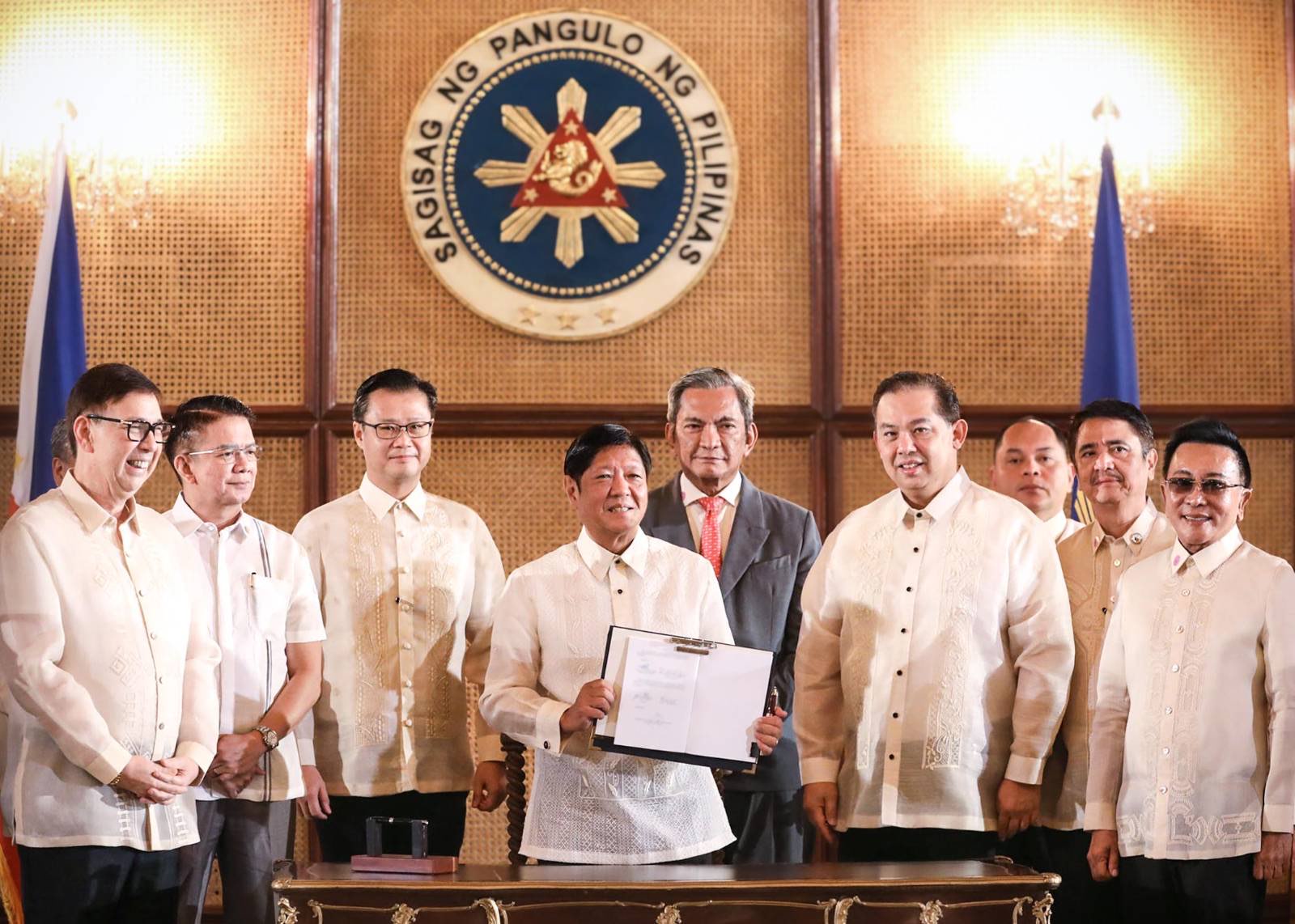Philippine President Ferdinand Marcos Jr. has formally signed Republic Act 112023, mandating a 12% value-added tax (VAT) on digital providers supplied by native and overseas digital service suppliers (DSPs). This new tax impacts well-liked platforms like Netflix, HBO, Disney+, and e-commerce giants like Amazon (NASDAQ: AMZN) and Shopee, making certain that overseas corporations contribute taxes when providing providers to the Philippine market.
“The speedy change in our digital panorama has created a spot in our tax system,” Marcos acknowledged in the course of the ceremonial signing. “At present, we signed the Worth-Added Tax on Digital Providers Legislation and we are actually bridging that hole. With this regulation, we are saying that in case your presence within the Philippine market is as actual as your income, then your tax duties must also be equally tangible.”

(Supply: Presidential Communications Workplace/Fb)
Marcos additionally clarified that no new taxes had been being imposed, however the Bureau of Inner Income (BIR) is now empowered to gather VAT on these providers successfully. The transfer addresses loopholes within the present tax framework, making certain overseas DSPs are actually topic to the identical obligations as their native counterparts.
Leveling the taking part in discipline for native companies
One of many key targets of RA 112023 is to make sure honest competitors between native and overseas service suppliers. In the course of the pandemic, many overseas corporations accessed the Philippine market with out paying taxes, creating an unfair benefit that overtaxed native companies.
Rep. Joey Salceda, chair of the Home Methods and Means panel emphasised that the regulation addresses this imbalance. Salceda mentioned overseas service suppliers loved untaxed entry, whereas resident content material producers paid VAT and revenue taxes. He added that this “unfairness” endured for years. With the regulation in place, all DSPs, no matter origin, are actually required to stick to the identical tax laws.
Scope of RA 112023: What providers are coated?
RA 112023 applies to a variety of digital providers supplied via on-line platforms, together with streaming providers, e-commerce, serps, and cloud computing. Platforms like Netflix, Disney+, Shein, and Temu might be topic to the 12% VAT.
Even and not using a bodily presence within the Philippines, overseas corporations should register with the BIR if their product sales or receipts exceed PHP3 million ($53,396) yearly.
BIR Commissioner Romeo Lumagui defined that the company will monitor compliance and maintain platforms accountable for managing sellers of their marketplaces.
Exemptions to advertise training and innovation
Marcos careworn that the regulation is designed to help innovation whereas defending important sectors. Instructional and public curiosity providers are exempt from the VAT, together with on-line programs and webinars acknowledged by the Division of Schooling (DepEd) or the Fee on Increased Schooling (CHED). This ensures that important providers stay reasonably priced and accessible, particularly within the training sector.
“This regulation is greater than making certain tax compliance, additionally it is in help of nation-building,” Marcos emphasised, highlighting its broader impression on public welfare.
Influence on customers and subscription charges
A priority raised by critics is the potential enhance in subscription charges for customers. BIR Commissioner Lumagui clarified that whereas DSPs might modify their pricing because of the VAT, any value enhance is at their discretion.
Former Bayan Muna consultant Carlos Zarate criticized the regulation as “anti-consumer,” suggesting that middle-class Filipinos might bear the brunt of elevated prices somewhat than massive worldwide firms.
Income allocation: Boosting the artistic industries

(Supply: Presidential Communications Workplace/Fb)
“For the subsequent 5 years, we estimate to gather PHP105 billion ($1.86 billion) from this measure. This is sufficient to construct 42,000 school rooms, greater than 6,000 rural well being models, 7,000 kilometers of farm-to-market roads,” the President mentioned.
“Moreover, 5 % of the revenues generated by this regulation might be allotted to our artistic industries. This implies our artists, filmmakers, musicians— the very individuals who fill our platforms with tales and with content material—will straight profit. This ensures that our artistic abilities will not be simply surviving in a aggressive digital market however might be allowed to prosper,” he added.
Studying from different Southeast Asian nations
The Philippines is following the lead of neighboring nations resembling Singapore, Indonesia, Malaysia, and Thailand, all of which have lately carried out related digital tax measures. The success of those nations in implementing VAT on overseas DSPs serves as a mannequin for the Philippines because it embarks on this new regulatory method.
A step in direction of a fairer digital economic system
Marcos highlighted the regulation as an important step towards a extra equitable digital economic system. “To our individuals, who deserve nothing lower than a system that works for them, this regulation shall herald much-needed income to assist construct a greater future for us all. I name for the help of all the businesses and entrepreneurs who might be coated by this regulation,” he mentioned. “I additionally urge the involved authorities businesses to promulgate the mandatory guidelines and implement the wanted steps to operationalize this regulation inside the interval that’s prescribed inside the Act.”
With RA 112023, the Philippines is making certain that each native and overseas corporations contribute equally to the nation’s growth, marking a shift in how digital providers are taxed and controlled.
Watch: The Philippines is transferring towards blockchain-enabled tech
title=”YouTube video participant” frameborder=”0″ enable=”accelerometer; autoplay; clipboard-write; encrypted-media; gyroscope; picture-in-picture; web-share” referrerpolicy=”strict-origin-when-cross-origin” allowfullscreen>



